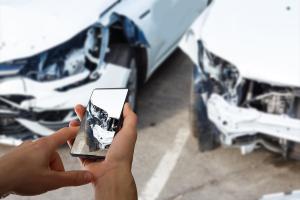How much will my car insurance go up after a claim?
Car insurance premiums can change quite significantly if you're not careful. It doesn’t take much provocation to alter your risk status for insurers, and making a claim is a major factor.
Whether you’ve had a bump in a car park or something more serious, you may be worried about your car insurance premium next year. Will it skyrocket? Will you lose your no-claims bonus? Would it be better to just pay out of pocket than make a claim and risk an increased premium?
Let’s take that uncertainty away by looking at what happens to your car insurance after you make a claim.
How much could your insurance go up after making a claim?
Let’s address the burning question first: how much is your car insurance likely to increase after you make a claim?
Frustratingly, there’s no simple answer to this question. Every insurer has its own particular way of calculating premiums. So, the amount your premium rises by (if it rises at all) depends on your personal circumstances, the circumstances of your claim, and the risk model your insurer is using.
However, we can look at some broad averages. Drivers who make a claim for an accident can expect their car insurance premiums to rise by around 20–50%. However, the actual amount varies depending on who is to blame for the claim, the severity and expense of the accident, and your overall driving record. You can also expect to pay less if your no-claims bonus is protected.
What key factors could affect how much your premium increases by?
Several variables go into the calculation of a post-claim car insurance premium:
- Type of claim: Theft, fire, injury, or accidents can all affect your premium.
- Your driving history and existing no-claims bonus (NCB): A long record of safe driving may cushion the blow, as can an NCB.
- The insurer’s internal risk model: Each car insurance company uses its own data and algorithms to assess how risky a driver you are.
- Claim amount and cost of repair: Bigger bills generally result in bigger hikes.
- Was a third party involved?: Third-party involvement can raise red flags for car insurance companies.
- Age and experience of the driver: Young or inexperienced drivers often face sharper increases.
Do car insurance premiums go up after every accident?
Unfortunately, insurance premiums do usually rise after a car accident and a claim, whether or not you were at fault. This is because insurers assess risk rather than culpability. A recent claim suggests that you are more likely to make a claim again, regardless of fault.
But this isn’t always the case. There are occasional exceptions. Some insurers may not raise your premium after a small claim or a no-fault accident, especially if you have a strong driving history. Others may offer accident forgiveness or a protected no-claims bonus (more on that in a moment).
Let’s take a closer look:
At-fault accidents
If you were responsible for the car accident, your insurance company will almost certainly raise your premium. You are also more likely to lose your no-claims bonus (unless it is protected — and even then, you may lose that protection, depending on how many other claims you’ve made).
No-fault accidents
Even if the other party was clearly to blame, you might still end up paying a higher car insurance price. It seems unfair, but the fact is that you’ve now got a claim on your record, and insurance companies see car insurance claims — even no-fault claims — as risk factors.
50/50 accidents
If the blame is evenly split between both parties, everyone will typically get a car insurance price hike. This happens because each driver ends up with a claim on their record.
What happens to your no-claims bonus (NCB) after a claim?
A no-claims bonus is a very useful thing to have. Every year that you don’t make a claim on your car insurance, you earn a discount on your premium. But what happens to it when you make a claim?
Well, it depends on the insurance company. Some insurance providers might scrap your NCB completely after a single at-fault claim. Others might knock a couple of years off the bonus. Others might be more lenient, depending on the circumstances.
This is where a protected NCB comes in handy. Some insurers will let you pay an extra fee to safeguard your NCB. This protection typically allows for a couple of extra car insurance claims before your bonus is affected.
It’s important to note that protecting your no-claims bonus doesn’t have an impact on your base premium going up after a car insurance claim. But it does preserve your discount level, which can soften the blow of a premium price hike.
Every insurer treats NCBs differently, so make sure to compare car insurance quotes to find something that suits you.
Should you claim at all? A quick cost-benefit analysis
Before you make a car insurance claim, ask yourself whether it’s really worth your premium going up. In some cases, it may work out cheaper in the long run to pay for the repairs for yourself out of pocket. After all:
- Making a claim may lead to a higher premium next year
- You may lose some or all of your no-claims bonus
- A small claim could cost less than the premium increase over the next few years.
If you’re not sure what to do for future claims, it might be worth running a quick cost/benefit analysis, factoring in things like the status of your no-claims bonus and the severity of the damage.
Ask yourself the following questions after an accident:
- Was someone injured? If so, it is almost always best to claim.
- Is the damage serious or costly to repair? If not, then it might be better not to make a claim.
- Is the repair cost significantly more than your excess? If the answer is yes, it’s probably a good idea to make a claim.
How can you reduce your premium after a claim?
If you do get into a car accident and have to make a car insurance claim, don’t despair. There are plenty of ways to bring your costs back down, even if your insurance company hikes your premium. Here are a few of the most surefire ways to get a lower car insurance premium:
- Increase your voluntary excess: A higher excess usually means a lower premium. However, you should only raise your excess to an amount you can realistically pay.
- Improve vehicle security: Installing alarms, immobilisers, or trackers can reduce the risk to your vehicle and therefore reduce your car insurance premium.
- Use a telematics (black box) policy: Telematics policies tend to operate on a pay-as-you-drive basis, so if you’re a safe driver, they can be a very good way to keep your car insurance manageable.
- Limit your mileage: People who drive less put their vehicles (and themselves) at less risk. Insurance providers like that. By lowering your mileage, you can lower your car insurance premium.
- Add a more experienced named driver: In some cases, this can lower your risk profile and reduce your premium.
- Shop around: Don’t accept your renewal quote without checking the market. MoneyExpert can help you compare car insurance quotes quickly and easily.
Key takeaways
Car insurance premiums often rise after a claim, but this isn’t always the case. Your personal circumstances, driving history, the type of car accident, and the amount you’re claiming for all have an influence.
Having a protected no-claims bonus can cushion the blow, but it won’t necessarily stop your premium from rising altogether. If you want to keep your car insurance premium down and your NCB safe, it may be more cost-effective to cover the repairs yourself.
However, you shouldn’t put yourself or your insurance validity at risk by failing to claim when you really should. Don’t drive in a dangerously damaged vehicle after a car accident, for example. Remember, your car insurance is there to help you in case of car accidents, and there are plenty of steps you can take to reduce your future premiums.
FAQs
Will my premium go up if I don’t claim after an accident?
Yes, it might. Notifying your insurer of an accident without making a claim can influence your risk profile, especially if it's a serious incident. But minor accidents that aren’t claimed for and don’t involve third parties are less likely to affect your premium unless reported.
Am I still covered if I’m hit by an uninsured driver?
You should be covered by comprehensive cover or uninsured driver protection. However, you should still report the car accident and get as many details as possible, as someone without car insurance is driving illegally.
Do I need to tell my insurer about previous accidents?
Most insurance providers will want a comprehensive driving history from you in order to assess your risk level. This means you will be asked to declare any accidents you’ve had in the last 3-5 years. Failing to disclose your full accident history could invalidate your car insurance policy.
Can I switch insurers after a claim?
You can switch insurers after a claim, but your car insurance claims history will follow you. A new insurer will factor your history with your previous insurer into their quote.
Do insurers share claim data?
Yes. The Claims and Underwriting Exchange (CUE) database stores information on all motor, home, and personal injury claims in a centralised data pool. Insurers will access it to check your history and assess your risk level.




